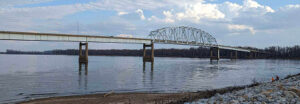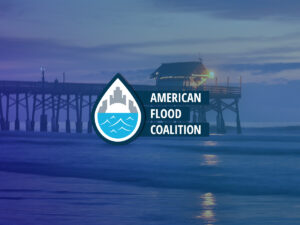Two Dozen Mayors and Local Leaders Participate in Summit on Flooding and Sea Level Rise in Washington, D.C.
The American Flood Coalition hosted a three-day summit with Mayors, council members, state officials, and federal experts.
WASHINGTON, DC — June 17, 2022 — This week the American Flood Coalition (AFC) hosted its Mayors Summit on Flooding and Sea Level Rise in Washington, D.C. AFC convened two dozen mayors and local leaders, as well as federal experts and members of Congress, to explore solutions, build relationships, and drive action to flooding and sea level rise.
“Local leaders are on the frontlines and understand firsthand the challenges posed by flooding and sea level rise,” said AFC Executive Director Melissa Roberts. “By connecting these leaders with each other, members of Congress, and federal experts, we can build on successful collaborations we are already seeing across the country.”
The three days of roundtable discussions and policy-focused meetings included talks by White House Senior Advisor and Infrastructure Coordinator Mitch Landrieu and high-level officials from the EPA, FEMA, and NOAA.
Additionally, Florida Chief Resilience Officer Wes Brooks, joined by AFC’s State Directors, discussed building state level resilience.
“Reducing flood impacts must be a priority but shouldn’t come at the cost of sacrificing a community’s character or residents’ quality of life,” said Florida Chief Resilience Officer Wes Brooks. “The Mayors Summit is a great forum to share lessons learned, including from Florida, where we’re standing shoulder to shoulder with our mayors and local governments to help deliver effective and locally driven flood resilience projects.”
Mayors and leaders also met with members of their Congressional delegation. Other topics covered in the Summit included federal funding and resources, policy, communications, and resilience planning.
###
About the American Flood Coalition
The American Flood Coalition is a nonpartisan group of cities, elected officials, military leaders, businesses, and civic groups that have come together to drive adaptation to the reality of higher seas, stronger storms, and more frequent flooding through solutions that support flood-affected communities and protect our nation’s residents, economy, and military installations. The Coalition has over 290 members across 21 states, and has recognized 29 Federal Champions from 12 states.
Cities, towns, elected officials, businesses, and local leaders wishing to join the American Flood Coalition or read more about the organization’s work can visit the Coalition’s website (www.floodcoalition.org) to find out more.




